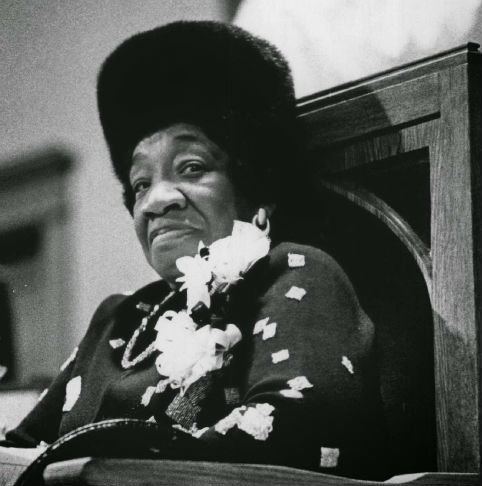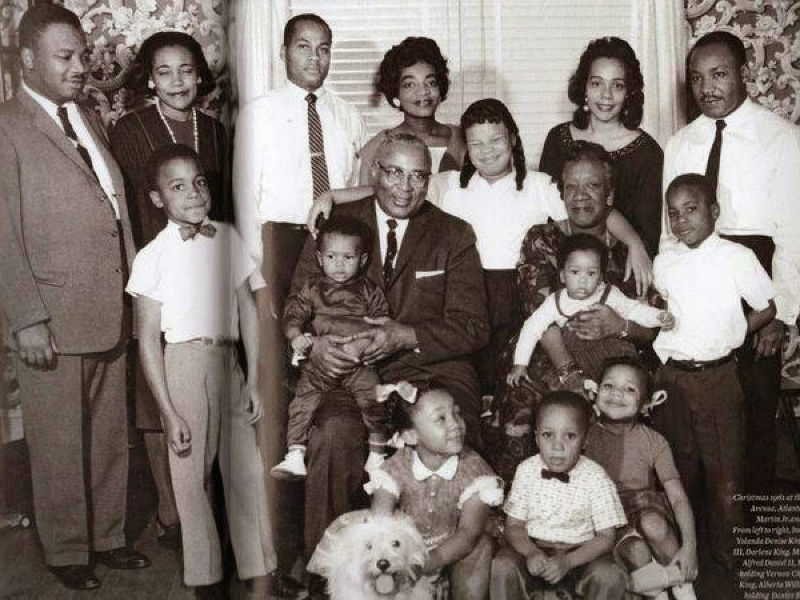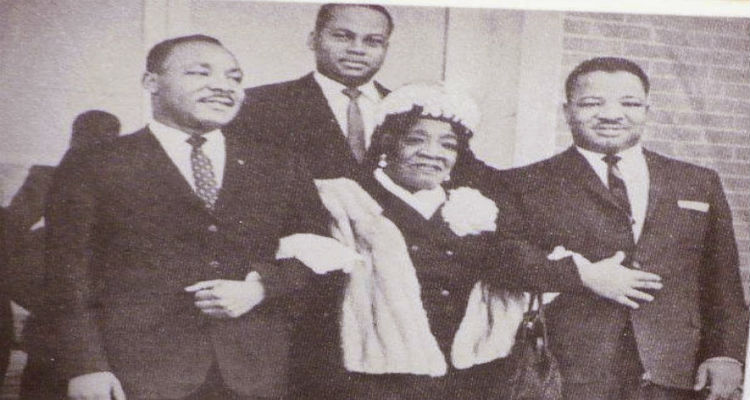Alberta Christine Williams King was Martin Luther King, Jr.’s mother and the wife of Martin Luther King, Sr. Martin Luther King, Jr. often spoke of the positive influence his mother had on his moral development, deeming her “the best mother in the world.” Mrs King played a significant role in the affairs of the Ebenezer Baptist Church, where her son was baptized and later became co-pastor. She was shot and killed in the church six years after the assassination of her son.
 Alberta Williams King was born on September 13, 1904, the only surviving child of Jennie Celeste Williams and Adam Daniel Williams, pastor of Atlanta’s Ebenezer Baptist Church in Atlanta. She graduated from high school at the Spelman Seminary, and earned a teaching certificate at the Hampton Normal and Industrial Institute (now Hampton University) in 1924.
Alberta Williams King was born on September 13, 1904, the only surviving child of Jennie Celeste Williams and Adam Daniel Williams, pastor of Atlanta’s Ebenezer Baptist Church in Atlanta. She graduated from high school at the Spelman Seminary, and earned a teaching certificate at the Hampton Normal and Industrial Institute (now Hampton University) in 1924.
She met Martin L. King (then known as Michael King), whose sister Woodie was boarding with her parents, shortly before she left for Hampton. After graduating, she announced her engagement to King during Sunday services at Ebenezer Baptist Church. Because the local school board did not allow married women in the classroom, Williams taught only briefly before her marriage on Thanksgiving Day 1926.
After their wedding, the newlyweds moved into an upstairs bedroom in the Williams’ home on Auburn Avenue, where their children were born.
Their first child, daughter Willie Christine King, was born on September 11, 1927. Martin Luther King Jr. followed on January 15, 1929, then Alfred Daniel Williams King I, named after his grandfather, on July 30, 1930.
After the death of A. D. Williams in 1931, Michael King succeeded his father-in-law as Ebenezer’s pastor and began using the name Martin Luther King. Alberta Williams King followed in her mother’s footsteps as a powerful presence in Ebenezer’s affairs. She founded the Ebenezer choir and was an organist there from 1932 to 1972. She was also organist for the Women’s Auxiliary of the National Baptist Convention from 1950 to 1962, and was active in the YWCA, the National Association for the Advancement of Colored People, and the Women’s International League for Peace and Freedom.

As a mother, Alberta worked diligently to instill a sense of self-respect within her three children. King remembered his childhood as one of harmony spent “in a very congenial home situation,” with parents who “always lived together very intimately.” King, Jr. maintained a close relationship with his mother throughout his life. Writing to her from the Connecticut tobacco farm where he worked during the summer while a high school student, he requested, “Mother dear, I want you to send me some fried chickens and rolls.” Four years later, as a first-year student at Crozer, he wrote his mother, “I met a fine chick in Phila who has gone wild over the old boy.” He also wrote an essay in which, he described his mother as being “behind the scene setting forth those motherly cares, the lack of which leaves a missing link in life.” Although her soft-spoken nature compelled her to avoid the publicity that accompanied her son’s international renown, she remained a constant source of strength to the King family, especially after King, Jr.’s assassination.
Martin Luther King, Jr. was assassinated by a gunman named James Earl Ray on April 4, 1968, while standing on the balcony of the Lorraine Motel in Memphis. King was in Memphis to lead a march in support of the local sanitation workers’ union. He was pronounced dead one hour later. Mrs. King, a source of strength after her son’s assassination, faced fresh tragedy the next year when her younger son and last-born child, Alfred Daniel Williams King I, who had become the assistant pastor at the Ebenezer Baptist Church, was found mysterious and “accidentally” drowned in the pool of his own yard.
Mrs King was shot and killed on June 30, 1974, at age 69, by Marcus Wayne Chenault, a 23-year-old black man from Ohio, as she sat at the organ of the Ebenezer Baptist Church.
According to witnesses Mrs King, whose husband, the Rev Martin Luther King Snr, was pastor of the church on Auburn Avenue, was playing the organ for the Lord’s Prayer near the start of the service when the attack began. A young black man jumped and screamed: “You must stop this! I am tired of all this! I’m taking over this morning.”
With that he drew two pistols and for the next 90 seconds fired wildly and continuously, hitting Mrs King, another elderly woman parishioner, and a 69-year-old church deacon, Mr Edward Boykin.
Mrs King was taken to the nearby Grady Memorial Hospital, where officials said she was “barely alive” on arrival. She died shortly afterwards from a gunshot wound to the right of her head.
The attack on Mrs King took place less than 100 yards from where her famous son, killed in 1968 at the age of 39, is buried.
When Martin Luther King, Sr., asked Chenault why he did it, the youth replied: “Because she was a Christian and all Christians are my enemies,” and claimed that he had decided that black ministers were a menace to black people. He said his original target had been Martin Luther King, Sr., but he had decided to shoot his wife instead because she was close to him. One of the church’s deacons, Edward Boykin, was also killed in the attack, and a woman was wounded. Chenault was sentenced to death; although this sentence was upheld on appeal, he was later resentenced to life in prison, partially as a result of the King family’s opposition to the death penalty. On August 3, 1995, he suffered a stroke, and was taken to a hospital, where he died of complications from his stroke on August 19, at age 44.
Mrs. King was interred at the South View Cemetery in Atlanta. Martin Luther King, Sr., died of a heart attack on November 11, 1984, at age 84 and was interred next to her.
Source:
https://en.wikipedia.org/wiki/Alberta_Williams_King
http://www.theguardian.com/world/2014/jul/01/martin-luther-kings-mother-slain-in-church-1974
http://kingencyclopedia.stanford.edu/encyclopedia/encyclopedia/enc_king_alberta_williams_1903_1974/



